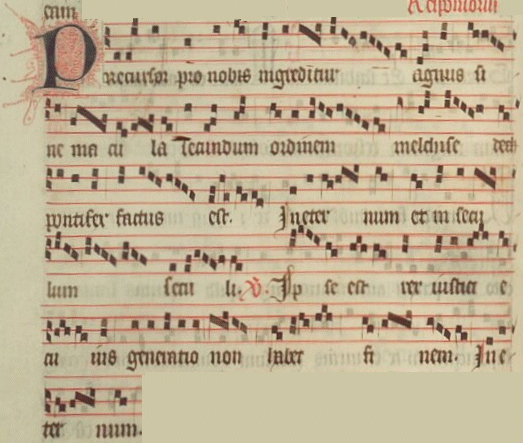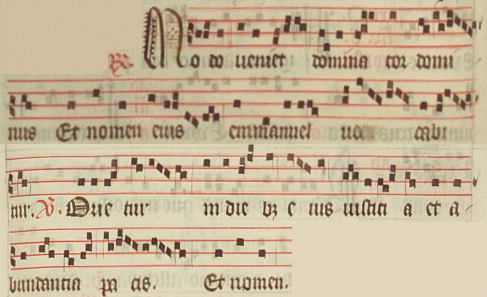Even Years: St. Augustine, Discourse on Psalm 109, 1-3
| Tempus constitutit Deus promissis suis, et tempus eis quae promisit implendis.
| God had a time for making his promises and a time for fulfilling them.
| | Promissionum tempus erat tempore prophetarum usque ad Ioannem Baptistam; ab illo autem et deinceps usque ad finem, tempus est implendi quae promissa sunt.
| His time for making promises was from the days of the prophets until the coming of John the Baptist. His time for fulfilling them was from then until the end of the world.
| | Fidelis Deus qui se nostrum debitorem fecit, non aliquid a nobis accipiendo, sed tanta nobis promittendo. Parum erat promissio, etiam scripto se teneri voluit, veluti faciens nobiscum chirographum promissorum suorum; ut, cum ea quae promisit solvere inciperet, in scriptura promissorum consideraremus ordinem solvendorum. Tempus itaque prophetiae, praedictio erat, ut saepe iam diximus, promissionum.
| God is faithful and he has put himself in our debt, not by receiving anything from us but by promising so much. Nor was a promise sufficient for him; he even bound himself in writing, giving us as it were a pledge in his own hand. He wanted us to see from Scripture, when the time for fulfilment came, how he was carrying out his promises one by one.
| | Promisit salutem aeternam, et beatam vitam cum angelis sine fine, et hereditatem immarcescibilem, gloriam sempiternam, dulcedinem vultus sui, domum sanctificationis suae in caelis, ex resurrectione a mortuis nullum deinceps moriendi metum. Hoc est promissum eius tamquam finale, quo decurrit nostra omnis intentio, quo cum venerimus, nihil amplius requiramus, nihil amplius exigamus. Sed ad illud quod erit in fine quo ordine veniatur, neque hoc tacuit promittendo et praenuntiando.
Promisit enim hominibus divinitatem, mortalibus immortalitatem, peccatoribus iustificationem, abiectis glorificationem.
| God promised us eternal salvation, everlasting bliss with the angels, an incorruptible inheritance, endless glory, the joyful vision of his face, his holy dwelling in heaven, and after the resurrection from the dead no further fear of dying. This is what he holds out to us at the end as the goal of all our striving. When we reach it we shall ask for nothing more. But as to how we are to reach our final goal, he revealed this too by promises and prophecies.
God promised men divinity, mortals immortality, sinners justification, outcasts glory.
| | Verumtamen, fratres, quia incredibile videbatur hominibus quod promittebat Deus, ex hac mortalitate, corruptione, abiectione, infirmitate, pulvere et cinere futuros homines aequales angelis Dei, non solum scripturam cum hominibus fecit, ut crederent, sed etiam fidei suae posuit mediatorem, non quemlibet principem, aut quemlibet angelum vel archangelum, sed unicum Filium: ut, qua via nos perducturus esset ad illum finem quem promisit, per eum ipsum Filium suum et ostenderet et praeberet.
| But because his promise that we who are mortal, corruptible, weak and of low estate, mere dust and ashes, were to be equal to the angels seemed incredible, God not only made a written covenant with us to win our faith, but he also gave us a mediator of his pledge. This mediator was not a prince, an angel, or an archangel, but his only Son; through his own Son he meant both to show us and give us the way by which he would lead us to the promised goal.
| | Parum enim erat Deo, si Filium suum faceret demonstratorem viae; eum ipsum viam fecit, ut per illum ires regentem te, ambulantem per se.
| He was not satisfied with sending his Son to show us the way. He made him the way itself.
| | Unicus itaque Filius Dei venturus ad homines, assumpturus hominem, et per id quod sumpsit futurus homo, moriturus, resurrecturus, ascensurus in caelum, sessurus ad dexteram Patris, et impleturus in gentibus quae promisit, et post impletionem promissorum suorum in gentibus etiam hoc impleturus ut veniat, et quod praerogavit exigat, discernat vasa irae a vasis misericordiae, reddat impiis quod minatus est, iustis quod pollicitus est.
| God's only Son, then, was to come among us, take our human nature, and in this nature be born as a man. He was to die, to rise again, to ascend into heaven, to sit at the right hand of the Father, and to fulfil his promises among the nations. After that he was also to fulfil his promise to come again, to demand what he had previously requested, to separate those deserving his anger from those deserving his mercy, to give the wicked what he had threatened and the just what he had promised.
| | Hoc ergo totum prophetandum fuit, praenuntiandum fuit, venturum commendandum fuit, ut non subito veniens horreretur, sed creditum expectaretur.
| All this had to be prophesied, foretold, and impressed on us as an event in the future so that we should not be terrified by its happening unexpectedly, but wait for it with faith.
|
Odd Years: Cyril of Alexandria, Commentary on Isaiah (Lib 4, or 1: PG 70, 859-861)
Καινὸς ὁ
ὕμνος, καὶ τῇ
τῶν πραγμάτων
καινότητι πρέπων.
«Εἴ τις γὰρ ἐν
Χριστῷ, καινὴ
κτίσις,» κατὰ τὸ
γεγραμμένον,
καὶ «τὰ ἀρχαῖα
παρῆλθε,
γέγονε δὲ τὰ πάντα
καινά.»
Λελύτρωνται
μὲν γὰρ ἐκ τῆς
Αἰγυπτίων
πλεονεξίας οἱ
ἐξ αἵματος
Ἰσραὴλ,
μεσιτεύοντος
τὸ τηνικάδε
τοῦ πανσόφου
Μωσέως, καὶ
πλινθείας
ἐξῄρηνται, καὶ
ἱδρώτων κενῶν
τῶν ἐπὶ
γηΐνοις
σπουδάσμασιν
ἔργον
κηδεστῶν
ἀγριότητος,
καὶ τῆς τοῦ
κρατοῦντος
ἀπανθρωπίας·
διεβιβάσθησαν
διὰ μέσης θαλάσσης,
ἔφαγον ἐν τῇ
ἐρήμῳ τὸ
μάννα, ἔπιον
ὕδωρ ἐκ πέτρας,
ἀβρόχῳ ποδὶ
διῆλθον τὸν
Ἰορδάνην,
εἰσεκομίσθησαν
εἰς τὴν γῆν τῆς
ἐπαγγελίας.
Τάδε ἐφ'
ἡμῖν πάντα
καινὰ, καὶ τῶν
ἀρχαίων ἀσυγκρίτως
ἐν ἀμείνοσιν.
Οὐ γὰρ
σαρκικῆς,
μᾶλλον δὲ πνευματικῆς
δουλείας
ἐξῃρήμεθα, καὶ
ἀντὶ τῶν περὶ
γῆν
σπουδασμάτων
τῶν ἐκ
φιλοσαρκίας
ἀπηλλάγμεθα
μολυσμῶν· οὐκ
ἐργοδιώκτας
ἐφύγομεν
Αἰγυπτίους,
οὐδὲ τύραννον
μὲν ἀσεβῆ, καὶ
ἀνήμερον, πλὴν ἄνθρωπον
καθ' ἡμᾶς, τοὺς
συνωθοῦντας
δὲ μᾶλλον εἰς
ἁμαρτίαν
πονηροὺς καὶ
ἀκαθάρτους
δαίμονας, καὶ
τὸν ταῖς
τούτων
ἀγέλαις
ἐφεστηκότα,
τοῦτ' ἔστι,
Σατανᾶν.
Διέβημεν
καθάπερ τινὰ
θάλατταν, τοῦ
παρόντος βίου
τὸν κλύδωνα,
καὶ τὴν ἐν
αὐτῷ τύρβην,
καὶ εἰκαίους
ὄντως
περισπασμούς.
Ἐφάγομεν τὸ
μάννα τὸ
νοητὸν, τὸν
ἄρτον τὸν ἐξ
οὐρανοῦ, τὸν
ζωὴν διδόντα
τῷ κόσμῳ·
ἐπίομεν ὕδωρ
ἐκ πέτρας, τοῖς
Χριστοῦ
νάμασιν ἐντρυφήσαντες,
νοητοῖς δὲ
δηλονότι.
Διέβημεν τὸν
Ἰορδάνην, ἀξιωθέντες
τοῦ ἁγίου
βαπτίσματος,
εἰσήλθομεν
εἰς τὴν τοῖς
ἁγίοις
ἐπηγγελμένην
καὶ πρέπουσαν
γῆν, ἧς καὶ
αὐτὸς ὁ Σωτὴρ
διαμνημονεύει,
λέγων· «Μακάριοι
οἱ πραεῖς, ὅτι αὐτοὶ
κληρονομήσουσι
τὴν γῆν.»
Οὐκοῦν
ἐπὶ καινοῖς
κατορθώμασι,
καινὸν ἔδει
γενέσθαι τὸν
ὕμνον παρὰ τῆς
ἀρχῆς αὐτοῦ·
τοῦτ' ἔστι, παρὰ
τῶν ὑπ' αὐτῷ
γεγονότων καὶ
ἀρχομένων ὑπ'
αὐτοῦ·
γενέσθαι δὲ
τὸν ὕμνον, ἤτοι
τὴν αὐτῷ πρέπουσαν
δοξολογίαν, οὐ
κατά γε μόνην
τὴν τῶν Ἰουδαίων
χώραν, ἀλλὰ γὰρ
ἀπ' ἄκρου τῆς γῆς
εἰς ἄκρον
δηλονότι, τοῦτ'
ἔστιν, ἅπασαν
τὴν ὑπ'
οὐρανόν. Πάλαι
μὲν γὰρ ἦν ἐν
τῇ Ἰουδαίᾳ
γνωστὸς ὁ Θεὸς,
καὶ ἐν μόνῳ τῷ
Ἰσραὴλ μέγα τὸ
ὄνομα αὐτοῦ.
Ἐπειδὴ δὲ κεκλήμεθα
διὰ Χριστοῦ
πρὸς
ἐπίγνωσιν
ἀληθείας, πλήρης
γέγονεν ὁ
οὐρανὸς καὶ ἡ
γῆ τῆς δόξης
αὐτοῦ. Οὕτω γάρ
που καὶ ὁ
Ψάλλων φησίν,
ὅτι «Πληρωθήσεται
τῆς δόξης
αὐτοῦ πᾶσα ἡ
γῆ.»
| |

